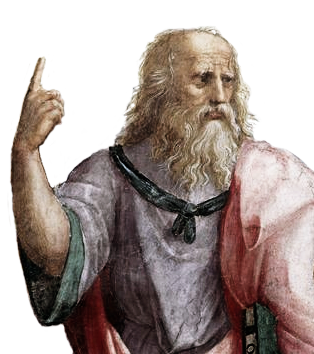
Apology (Plato)
The Apology of Socrates (Greek: Ἀπολογία Σωκράτους, Apología Sokrátous; Latin: Apologia Socratis), written by Plato, is a Socratic dialogue of the speech of legal self-defence which Socrates (469–399 BC) spoke at his trial for impiety and corruption in 399 BC.[1]
For the article on Xenophon's work on the same subject, see Apology of Socrates to the Jury. For other uses, see Apology (disambiguation).
Specifically, the Apology of Socrates is a defence against the charges of "corrupting the youth" and "not believing in the gods in whom the city believes, but in other daimonia that are novel" to Athens (24b).[2]
Among the primary sources about the trial and death of the philosopher Socrates, the Apology of Socrates is the dialogue that depicts the trial, and is one of four Socratic dialogues, along with Euthyphro, Phaedo, and Crito, through which Plato details the final days of the philosopher Socrates.
Introduction[edit]
The Apology of Socrates begins with Socrates addressing the jury of perhaps 500 Athenian men to ask if they have been persuaded by the Orators Lycon, Anytus, and Meletus, who have accused Socrates of corrupting the young people of the city and impiety against the pantheon of Athens. The first sentence of his speech establishes the theme of the dialogue—that philosophy begins with an admission of ignorance. Socrates later clarifies that point of philosophy when he says that whatever wisdom he possesses comes from knowing that he knows nothing (23b, 29b).
In the course of the trial, Socrates imitates, parodies, and corrects the Orators, his accusers, and asks the jury to judge him by the truth of his statements, not by his oratorical skill (cf. Lysias XIX 1,2,3; Isaeus X 1; Isocrates XV 79; Aeschines II 24). Socrates says he will not use sophisticated language—carefully arranged ornate words and phrases—but will speak using the common idiom of the Greek language. Socrates says that he will speak in the manner he has used in the agora and at the money tables which he states is his native tongue and the fashion of his country. Although offered the opportunity to appease the prejudices of the jury, with a minimal concession to the charges of corruption and impiety, Socrates does not yield his integrity to avoid the penalty of death. The jury condemns Socrates to death.
In the society of 5th-century BC Athens, the three men who formally accused the philosopher Socrates of impiety and corruption against the people and the city, officially represented the interests of the politicians and the craftsmen, of the scholars, poets, and rhetoricians. The accusers of Socrates were:
In his defence at trial, Socrates faced two sets of accusations: (i) asebeia (impiety) against the pantheon of Athens, by introducing new gods; and (ii) corruption of Athenian youth, by teaching them to doubt the status quo. Socrates says to the court that these old accusations arise from years of gossip and prejudice against him; hence, are matters difficult to address. He then reformulates the diffuse accusations from the orators against him into the proper legal form: "Socrates is committing an injustice, in that he inquires into things below the earth and in the sky; and makes the weaker argument the stronger; and teaches others to follow his example" (19b-c).
Socrates also says that the accusations for which he is answering in court already had been spoken and published by the comic poet Aristophanes, and are therefore beyond the legal scope of a trial for corruption and impiety. Years earlier, in the play The Clouds (423 BC), Aristophanes lampooned Socrates as a charlatan, the paradigm philosopher of atheist and scientific sophistry—carefully arranged arguments constructed of ornate words and phrases—misrepresented as wisdom. In light of that definition, Socrates defensively argues that he cannot be mistaken for a Sophist philosopher because Sophists are wise men, are thought to be wise by the people of Athens, and, thus, are highly paid for their teaching; whereas he (Socrates) lives in ten-thousand-fold poverty, and knows nothing noble and good (23c).
For his self-defence, Socrates first eliminates any claim that he is a wise man. He says that Chaerephon, reputed to be impetuous, went to the Oracle of Delphi and asked her, the prophetess, Pythia, to tell him of anyone wiser than Socrates. The Pythia answered to Chaerephon that there was no man wiser. On learning of that oracular pronouncement, Socrates says he was astounded, because, on the one hand, it is against the nature of the Oracle to lie, but, on the other hand, he knew he was not wise. Therefore, Socrates sought to find someone wiser than himself, so that he could take that person as evidence to the Oracle at Delphi. Hence why Socrates minutely queried everyone who appeared to be a wise person. In that vein, he tested the minds of politicians, poets, and scholars, for wisdom; although he occasionally found genius, Socrates says that he found no one who possessed wisdom; yet, each man was thought wise by the people, and each man thought himself wise; therefore, he thought he was the better man, because he was aware that he was not wise.
Socrates explained that the young, rich men of the city of Athens have little to do with their time. They, therefore, follow him about the city, observing his questioning of intellectual arguments in dialogue with other intellectual men. In turn, young men imitate the method of Socrates. Socrates thought that the arguments of the men he examined were wanting, and when he said this, to not lose face, they would restate stock accusations against Socrates; that he is a morally abominable man who corrupts the youth of Athens with sophistry and atheism. In his defence, Socrates said: "For those who are examined, instead of being angry with themselves, are angry with me!".